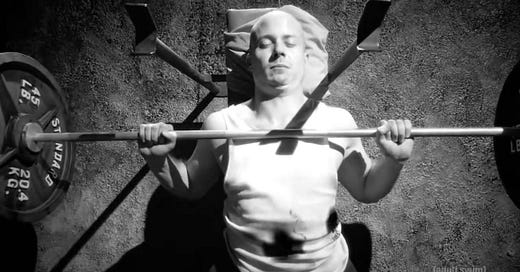Becoming Oblivion, by Sean Kilpatrick
Writer Sean Kilpatrick looks back upon Million Dollar Extreme, finding that if the comedy troupe wasn't exactly its generation's voice, it was at least its pallbearer...
“The Man Who Would Never Be…What They Made Him to Be” is an MDE: World Peace skit that constructs an epic opera of its four minute runtime – an abstemiously framed millennial iconography confounding as it is profound, the fever dream of Glass’s Einstein on the Beach stripped to a synth / punk lamentation, a generation-wide disavow, a mood piece distinguishing the genius of Hyde, Carrol, and Rochefort as far more recondite than their merely weird predecessors. Million Dollar Extreme weren’t the voices of their generation; they were its pallbearers. There is no method by which to unravel this skit, perhaps the saddest ever performed (one of their many dark citizen portraits (“leaning teacher”, “‘roid rage businessman”), somehow conversely emphasizing a thousand underlying comedic tonalities): collective nihilism snapshots, masculinity under permanent house arrest, beauty brought flat through a brain’s disruption as the staged mosaic of our lives winds down to pointlessness (your best accomplishment is just busywork on Broadway), a livid denial carried across every event, fatalism confirmed. In a world of ombudsmen winning Nobel prizes for swinging their purse, mainstream TV shed its final art half a decade back.
A gaunt shell, a pulsated shadow of a man is arrested for nothing, sustaining himself through decades of prison with exaggerated lack of concern, contumacious bravado, ironic disinterest (even while shanked). Intentionally flimsy sets revolve time by light. The man remains blameless about anything done to him, a perfect proud citizen, somewhat admiringly self-contained (shattered hero), yet stretched thin, beyond expression. His eyes keep losing their sponsorship. He has become a Russian doll of his own petty death at the hands of others. The frame halts with him, music crooning (John Maus looms: grand inquisitor / Bojangles-esque seraph), channeling the man’s insides. We’re glued to the mattress (parentally halfway housed), steered by a stroke. Our teen tantrum finally embarks – us as ground zero. Shot through an umbrageous, twentieth century noir haze, Carrol performs as a blank slate millennial whisked feeble on the unutterable brunt of once legible constellations. Trapped onstage in a lifelong montage where each voice echoes demonically and each backdrop is memory’s annihilation lullaby passing away into syndication, a rerun at the morgue, he’s manipulated onward (as are we, via malevolence alone – hang an “out to lunch” sign around yourself, because we’re just graffiti scratched on existence, an accumulative “hear no evil” whimper shucked through claustrophobic passages, gnawing some cyanide destiny, any useful direction heretofore tatted on our ass while asleep). The sunny picket fence we opened on is in ruins. The sets go topsy turvy with simultaneous action, past and present: interpretive chronology. These delayed propulsions lapse together to the beat, cruel rap lyrics droning further ironies. Haloed into infinity, collapsed to bed (a malady he’ll never sleep off), mattress stuffing blindingly white, the man regurgitates his rage, feeding into the enormity of waste around him. Living indifferently has pet him to pieces (a hint of hope’s thrown in atop the horror, toxic frosting – scarier, meaner, sadder to introduce hope). Everything’s a death sentence carried over too long. Nothing you’ve done is legal, a constant verdict elongated to survive. The transient punchline of your life’s massacre won’t be counted, but you can shrug through anything – and it’s funny (How prescient and truly dystopian that MDE were soon removed from their platform for no reason – roseate Kafka hellscapes unfurl).
Similarly, Glass explodes a single year in Vienna with suicidal dancing minimized across time, a paused exhaust, driven arithmetic turned alien and sweaty. When I saw this dance performed live, the dancers’ fluids went deep into the audience. The moves were so violent they took turns collapsing behind the curtain, then picking themselves back up to run through the broken end of a spin cycle at their bodies’ expense – Herzog is our poet of wonder amidst desolation, the eye of sublime reckoning. That’s why Kinski was his best vessel. All the fatalistic inevitability of nature without environmentalist nail-biting. All the beauty, none of the fashion. A fully considered subject rendered by (and into) intuition. Man as the beast who can hypnotize itself to complete astonishing feats. He makes madness make sense. He’s stock-still in the moment – Glass hits pause more often, extremely esoterically, underlining that we’re killed, piecemeal, by a math too vast to tally. The boomer visions stalled and zipped through with such formal bluster lead to Charles Carrol gloating before a doomed picket fence. Romance novels, aliens and conspiracy rolled into Candid Camera meets TV Carnage, paradoxical isogonal spherinder prisms recursively cranked, multiplex cylinder seals over which we can only hang our heads and weep, bottomless weeping, hysteria without dimension, grinning skull impressions in the snot bubble. “The Man Who Would Never Be…”’s box spring reads (each re-watch reveals another beautiful layer): TO GO TO BED FOREVER.
Sean Kilpatrick is an American writer and poet. Follow him on Twitter @Sean_Kilpatrick




